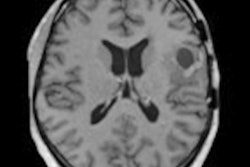
Analysis of MRI biomarkers can identify physiological processes that indicate recurrence of glioblastoma -- as early as six months before it could be diagnosed on a conventional MRI exam, according to researchers from Karl Landsteiner University of Health Sciences in Krems, Austria.
In a retrospective study published online in Clinical Cancer Research, a team of Austrian and German researchers used MRI to observe changes in physiological biomarkers in the areas of the brain that had a later recurrence of glioblastoma. These patterns included a decrease in vessel density in the brain tissue and an increasing lack of oxygen, according to the researchers, led by Andreas Stadlbauer, PhD.
The researchers found that recurrent glioblastoma manifested in two different phases.
"Infiltrating [tumor] cells -- that cannot be killed during preliminary treatment -- recruit existing microvessels to ensure their own supply, but end up weakening and destroying them," Stadlbauer said in a statement. "This was the process that we observed in the form of decreased vessel density. The related decline in oxygen supply and the resulting tissue hypoxia triggers formation of microvessels, which -- with a delay of 30 days -- is seen in the restoration of blood supply and improved oxygen and nutrient supply that plays a decisive role in aggressive [tumor] growth."
These findings could pave the way for the development of an MRI-based early diagnosis technique for recurrent glioblastoma, according to the researchers.



















